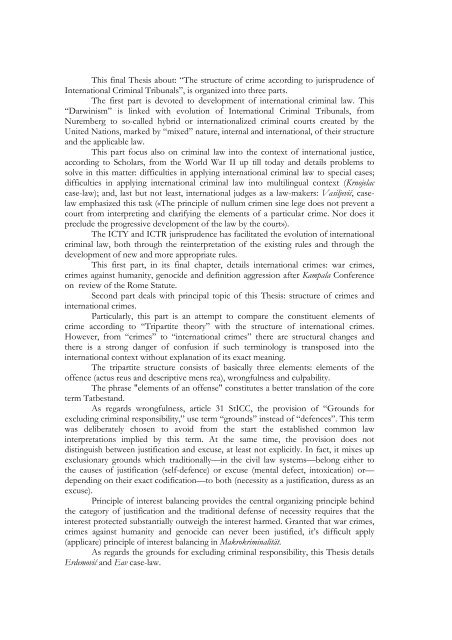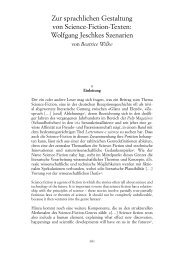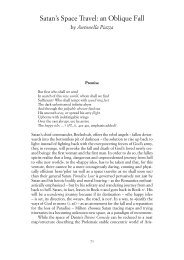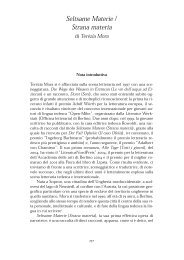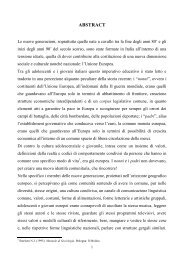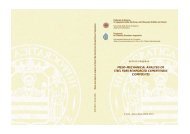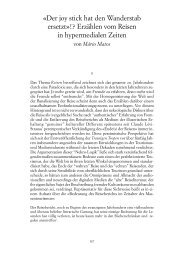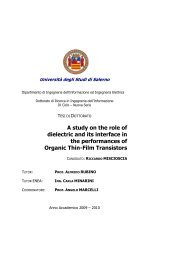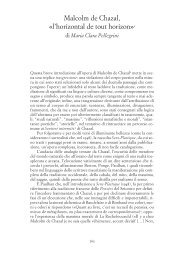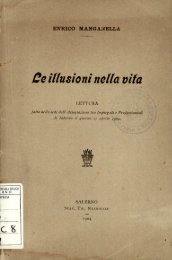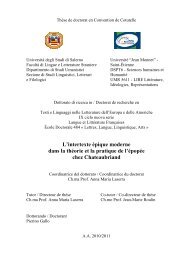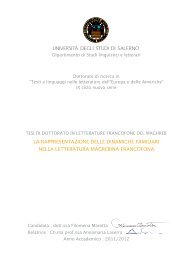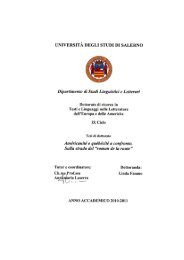abstract in italiano A. Buono.pdf - EleA@UniSA - Università degli ...
abstract in italiano A. Buono.pdf - EleA@UniSA - Università degli ...
abstract in italiano A. Buono.pdf - EleA@UniSA - Università degli ...
Create successful ePaper yourself
Turn your PDF publications into a flip-book with our unique Google optimized e-Paper software.
This f<strong>in</strong>al Thesis about: “The structure of crime accord<strong>in</strong>g to jurisprudence of<br />
International Crim<strong>in</strong>al Tribunals”, is organized <strong>in</strong>to three parts.<br />
The first part is devoted to development of <strong>in</strong>ternational crim<strong>in</strong>al law. This<br />
“Darw<strong>in</strong>ism” is l<strong>in</strong>ked with evolution of International Crim<strong>in</strong>al Tribunals, from<br />
Nuremberg to so-called hybrid or <strong>in</strong>ternationalized crim<strong>in</strong>al courts created by the<br />
United Nations, marked by “mixed” nature, <strong>in</strong>ternal and <strong>in</strong>ternational, of their structure<br />
and the applicable law.<br />
This part focus also on crim<strong>in</strong>al law <strong>in</strong>to the context of <strong>in</strong>ternational justice,<br />
accord<strong>in</strong>g to Scholars, from the World War II up till today and details problems to<br />
solve <strong>in</strong> this matter: difficulties <strong>in</strong> apply<strong>in</strong>g <strong>in</strong>ternational crim<strong>in</strong>al law to special cases;<br />
difficulties <strong>in</strong> apply<strong>in</strong>g <strong>in</strong>ternational crim<strong>in</strong>al law <strong>in</strong>to multil<strong>in</strong>gual context (Krnojelac<br />
case-law); and, last but not least, <strong>in</strong>ternational judges as a law-makers: Vasiljević, caselaw<br />
emphasized this task («The pr<strong>in</strong>ciple of nullum crimen s<strong>in</strong>e lege does not prevent a<br />
court from <strong>in</strong>terpret<strong>in</strong>g and clarify<strong>in</strong>g the elements of a particular crime. Nor does it<br />
preclude the progressive development of the law by the court»).<br />
The ICTY and ICTR jurisprudence has facilitated the evolution of <strong>in</strong>ternational<br />
crim<strong>in</strong>al law, both through the re<strong>in</strong>terpretation of the exist<strong>in</strong>g rules and through the<br />
development of new and more appropriate rules.<br />
This first part, <strong>in</strong> its f<strong>in</strong>al chapter, details <strong>in</strong>ternational crimes: war crimes,<br />
crimes aga<strong>in</strong>st humanity, genocide and def<strong>in</strong>ition aggression after Kampala Conference<br />
on review of the Rome Statute.<br />
Second part deals with pr<strong>in</strong>cipal topic of this Thesis: structure of crimes and<br />
<strong>in</strong>ternational crimes.<br />
Particularly, this part is an attempt to compare the constituent elements of<br />
crime accord<strong>in</strong>g to “Tripartite theory” with the structure of <strong>in</strong>ternational crimes.<br />
However, from “crimes” to “<strong>in</strong>ternational crimes” there are structural changes and<br />
there is a strong danger of confusion if such term<strong>in</strong>ology is transposed <strong>in</strong>to the<br />
<strong>in</strong>ternational context without explanation of its exact mean<strong>in</strong>g.<br />
The tripartite structure consists of basically three elements: elements of the<br />
offence (actus reus and descriptive mens rea), wrongfulness and culpability.<br />
The phrase "elements of an offense" constitutes a better translation of the core<br />
term Tatbestand.<br />
As regards wrongfulness, article 31 StICC, the provision of “Grounds for<br />
exclud<strong>in</strong>g crim<strong>in</strong>al responsibility,” use term “grounds” <strong>in</strong>stead of “defences”. This term<br />
was deliberately chosen to avoid from the start the established common law<br />
<strong>in</strong>terpretations implied by this term. At the same time, the provision does not<br />
dist<strong>in</strong>guish between justification and excuse, at least not explicitly. In fact, it mixes up<br />
exclusionary grounds which traditionally—<strong>in</strong> the civil law systems—belong either to<br />
the causes of justification (self-defence) or excuse (mental defect, <strong>in</strong>toxication) or—<br />
depend<strong>in</strong>g on their exact codification—to both (necessity as a justification, duress as an<br />
excuse).<br />
Pr<strong>in</strong>ciple of <strong>in</strong>terest balanc<strong>in</strong>g provides the central organiz<strong>in</strong>g pr<strong>in</strong>ciple beh<strong>in</strong>d<br />
the category of justification and the traditional defense of necessity requires that the<br />
<strong>in</strong>terest protected substantially outweigh the <strong>in</strong>terest harmed. Granted that war crimes,<br />
crimes aga<strong>in</strong>st humanity and genocide can never been justified, it’s difficult apply<br />
(applicare) pr<strong>in</strong>ciple of <strong>in</strong>terest balanc<strong>in</strong>g <strong>in</strong> Makrokrim<strong>in</strong>alität.<br />
As regards the grounds for exclud<strong>in</strong>g crim<strong>in</strong>al responsibility, this Thesis details<br />
Erdemović and Eav case-law.


